Access to Dental Care for Immigrant Families
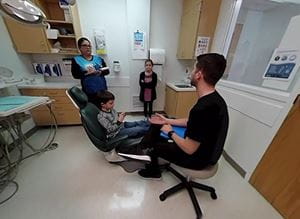 In this virtual reality simulation developed for the Dental Care for Immigrants project, the user assumes the role of a parent obtaining dental care for a child in a Spanish-speaking country, thereby experiencing some of the challenges immigrant families face in obtaining health care in a foreign country; these challenges can include things such as language and cultural barriers, limited health literacy, and poor understanding of the health care system. The simulation also includes virtual discussion to highlight the effect on the patients and provides guidance on communication techniques. The VR simulation consists of both virtual scenes and 360-degree video recording with interactive components to further engage users.
In this virtual reality simulation developed for the Dental Care for Immigrants project, the user assumes the role of a parent obtaining dental care for a child in a Spanish-speaking country, thereby experiencing some of the challenges immigrant families face in obtaining health care in a foreign country; these challenges can include things such as language and cultural barriers, limited health literacy, and poor understanding of the health care system. The simulation also includes virtual discussion to highlight the effect on the patients and provides guidance on communication techniques. The VR simulation consists of both virtual scenes and 360-degree video recording with interactive components to further engage users.
| Would you like to schedule a session? | Contact us here |



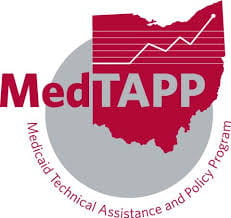
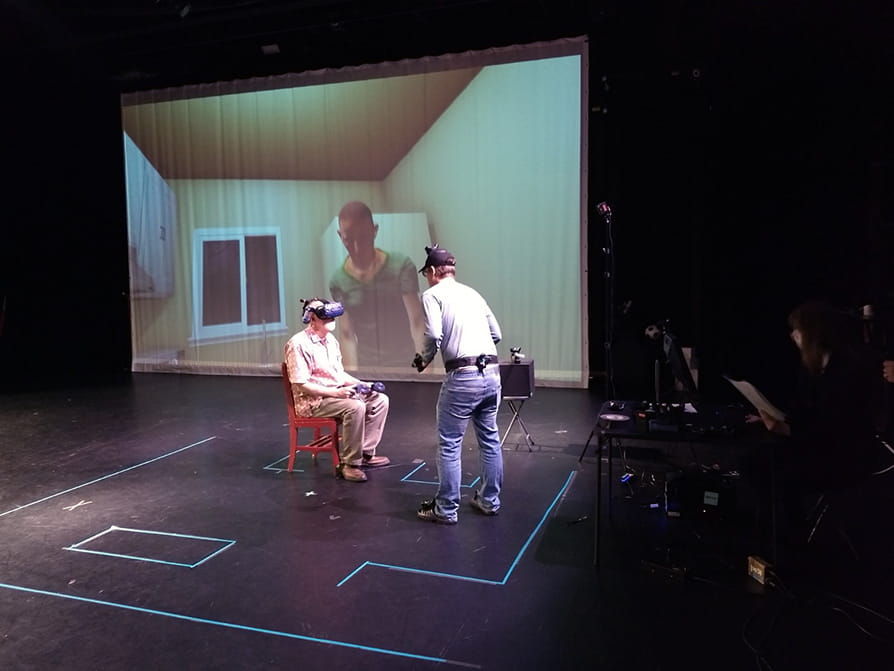 Several virtual reality-based simulations are offered by The Ohio State University in partnership with the Ohio Department of Medicaid and the Ohio Colleges of Medicine Government Resource Center. The simulations aim to train clinicians to better engage with patients with health disparities.
Several virtual reality-based simulations are offered by The Ohio State University in partnership with the Ohio Department of Medicaid and the Ohio Colleges of Medicine Government Resource Center. The simulations aim to train clinicians to better engage with patients with health disparities. 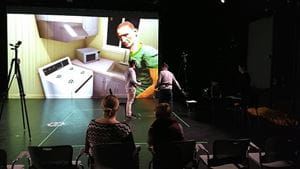 The VR Experience of Dementia system (VR-ED) developed at Ohio State’s Advanced Computing Center for the Arts and Design (ACCAD) enables immersive scenario-based enactments in VR. VR-ED highlights the effects of short-term memory loss as well as time and place disorientation, which are common dementia symptoms that are difficult to simulate through other forms of dementia care training. The experience provides an experiential insight into the behavior of people living with dementia, engaging practitioners in perspective-taking training to build empathy for patients living with dementia and their caretakers.
The VR Experience of Dementia system (VR-ED) developed at Ohio State’s Advanced Computing Center for the Arts and Design (ACCAD) enables immersive scenario-based enactments in VR. VR-ED highlights the effects of short-term memory loss as well as time and place disorientation, which are common dementia symptoms that are difficult to simulate through other forms of dementia care training. The experience provides an experiential insight into the behavior of people living with dementia, engaging practitioners in perspective-taking training to build empathy for patients living with dementia and their caretakers.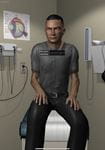 This simulation trains learners to interact with patients with limited English proficiency (LEP). The session begins with a brief e-learning module on interpretive services and cultural competency. Next, learners conduct a virtual healthcare visit with an LEP patient in either a VR simulation with a headset or via an iPad-based application.
This simulation trains learners to interact with patients with limited English proficiency (LEP). The session begins with a brief e-learning module on interpretive services and cultural competency. Next, learners conduct a virtual healthcare visit with an LEP patient in either a VR simulation with a headset or via an iPad-based application. 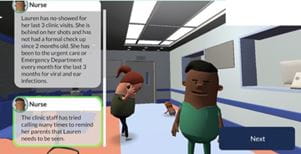 VARIAT is an app that can be installed on a mobile smart device (such as a smartphone or tablet) to bring the training to the learners in a portable and accessible fashion. VARIAT aims to improve awareness of implicit biases among Medicaid providers, to educate them on how these biases and other social determinants of health may lead to inequitable care, and to offer strategies and resources that may minimize health disparities.
VARIAT is an app that can be installed on a mobile smart device (such as a smartphone or tablet) to bring the training to the learners in a portable and accessible fashion. VARIAT aims to improve awareness of implicit biases among Medicaid providers, to educate them on how these biases and other social determinants of health may lead to inequitable care, and to offer strategies and resources that may minimize health disparities.